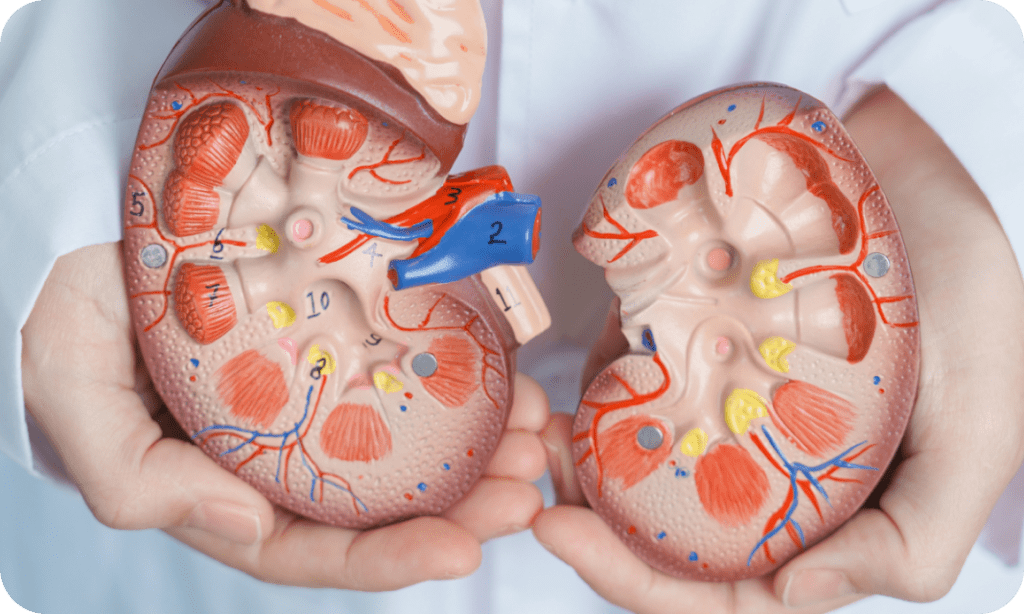
Adrenal Gland Tumors
Adrenal gland tumors are abnormal growths that form in the adrenal glands, which are located on top of each kidney. These glands produce important hormones, including cortisol, adrenaline, and aldosterone, which regulate various bodily functions such as metabolism, immune response, and blood pressure. Adrenal gland tumors can be benign (noncancerous) or malignant (cancerous). Some tumors may cause an overproduction of hormones, leading to a range of symptoms, while others may not produce any hormones (nonfunctional tumors).
Detailed Information
The exact cause of most adrenal gland tumors is unknown, but certain risk factors and genetic conditions can increase the likelihood of developing these tumors:
1. Genetic Mutations: Inherited conditions like Multiple Endocrine Neoplasia (MEN1), Li-Fraumeni syndrome, and von Hippel-Lindau disease can raise the risk of adrenal tumors.
2. Family History: A family history of adrenal tumors or related genetic conditions may increase the likelihood of developing these tumors.
3. Age: Adrenal tumors can occur at any age but are more common in adults between 40 and 60 years old.
There are different types of adrenal tumors, each with its unique characteristics:
1. Adenomas: These are noncancerous, hormone-producing tumors that often cause an overproduction of certain hormones.
2. Adrenocortical Carcinoma: A rare, aggressive cancer that begins in the outer layer of the adrenal gland and often causes hormone imbalances.
3. Pheochromocytomas: These tumors form in the adrenal medulla and cause the overproduction of adrenaline and noradrenaline, leading to high blood pressure.
4. Neuroblastomas: A rare cancer that develops in nerve tissue and often affects children.
Symptoms of adrenal gland tumors vary depending on whether the tumor is producing hormones. Common signs include:
• High Blood Pressure: Caused by overproduction of adrenaline or cortisol.
• Unexplained Weight Gain or Loss: Due to hormonal imbalances.
• Excessive Sweating or Heart Palpitations: Caused by the overproduction of adrenaline.
• Muscle Weakness: Particularly in the legs and arms.
• Facial Flushing and Anxiety: Due to increased hormone levels.
• Abdominal Pain or Fullness: Especially if the tumor is large.
If a tumor is nonfunctional (not producing hormones), it may not cause symptoms until it becomes large enough to press on nearby organs.
There is no definitive way to prevent adrenal gland tumors, but you can reduce your risk by:
1. Genetic Counseling: If you have a family history of adrenal tumors or related syndromes, genetic testing and counseling may help assess your risk.
2. Routine Checkups: Early detection through regular medical checkups can help monitor hormone levels and detect any abnormalities early.
Book Your
Consultation Now
Schedule an appointment with the leading uro-oncologist in Bangalore, Dr. Anil
Kumar T. Benefit from expert care and advanced treatment options for all your
urological needs, delivered with a patient-centered approach.

Book Your Consultation Now
Schedule an appointment with the leading uro-oncologist in Bangalore, Dr. Anil
Kumar T. Benefit from expert care and advanced treatment options for all your
urological needs, delivered with a patient-centered approach.

Resolve Your Queries
Answers to the most common inquiries about urological conditions, treatments, and patient care. Designed to offer quick guidance and help you better understand, ensuring you feel informed and confident in your healthcare decisions.
Still have queries about Urology & Uro Oncology? Hit the button below.
Adrenal gland tumors are abnormal growths that develop in the adrenal glands, which are located on top of each kidney. These tumors can be benign (non-cancerous) or malignant (cancerous) and may affect hormone production in the body.
Symptoms may vary depending on whether the tumor is functioning (producing hormones) or non-functioning. Common symptoms include high blood pressure, weight gain, excessive hair growth, irregular menstrual cycles, or fatigue. Some individuals may have no symptoms, and the tumor is found incidentally during imaging tests.
Adrenal gland tumors are typically diagnosed through imaging studies like CT scans, MRIs, or ultrasounds. Blood and urine tests may also be conducted to evaluate hormone levels and determine if the tumor is functioning.
Treatment depends on the tumor’s size, type, and whether it is causing symptoms. Options include surgical removal (adrenalectomy), medications to manage hormone production, or monitoring for non-functioning benign tumors. Malignant tumors may require additional treatments like chemotherapy or radiation.
Dr. Anil Kumar T is a highly skilled urologist with expertise in diagnosing and treating adrenal gland tumors. His personalized approach ensures accurate diagnosis and effective treatment plans tailored to your needs. Book an appointment with the best urologist, Dr. Anil Kumar T, for expert care.
Visit Us
Zymus Hospital Address
No.1, K NO. 92, Nanjappa Complex, Kanakapura Rd, Raghuvanahalli, Bangalore City Municipal Corporation Layout, Bengaluru, Karnataka 560062
Menu
Quick Links
Copyright © 2024. Dr Anil Kumar T

